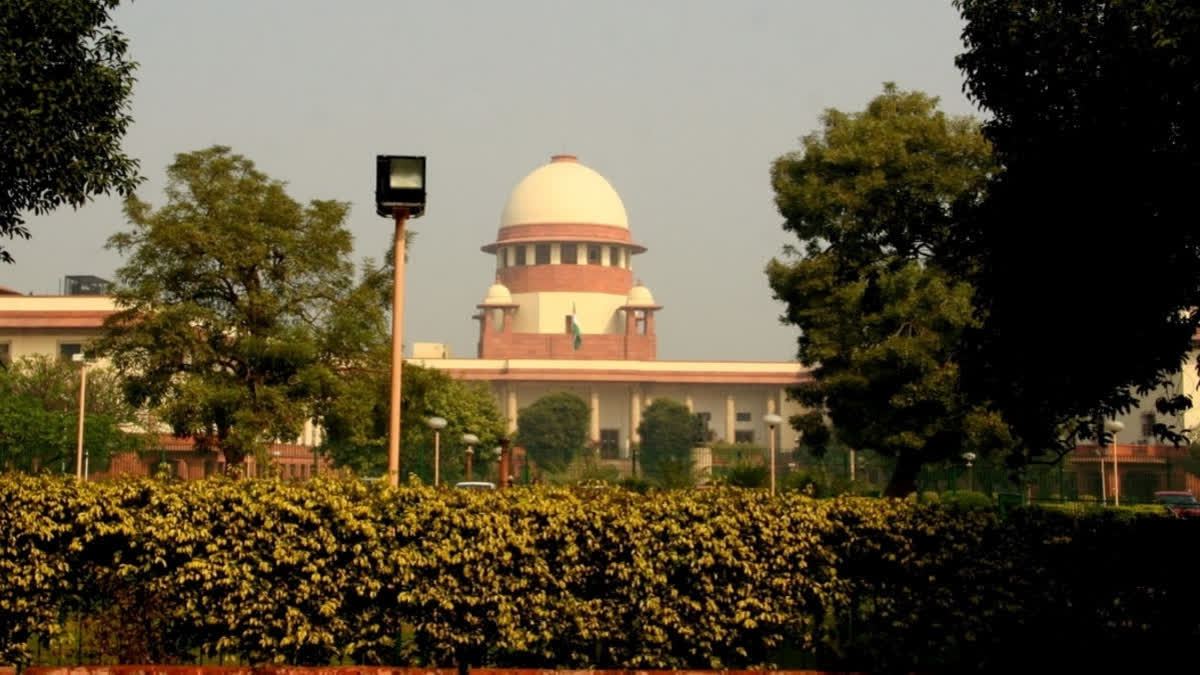New Delhi: The Supreme Court on Thursday said that the anti-pollution graded response action plan (GRAP)-4 measures except those relating to schools will continue to be in operation till the next date of hearing on December 2.
The matter came up before a bench comprising Justices Abhay S Oka and Augustine George Masih. The bench said GRAP-4 is in operation and it must stay in operation till Monday, and emphasised that it is important to expedite action against officials' for a serious lapse in the implementation of GRAP-4 measures.
"We make it clear that all GRAP IV measures except the measures which are modified in respect of schools will continue to operate till Monday," said Justice Oka. On November 25, the top court asked the Commission for Air Quality Management (CAQM) in the National Capital Region (NCR) and adjoining areas to examine beginning physical classes in schools and colleges.
On Thursday, the bench said: "In the meantime, the air quality commission will hold a meeting and come out with the suggestion about moving from GRAP 4 to GRAP 3 or GRAP 2. We also make it clear that it is not necessary that all measures which are provided in GRAP 4 should be dispensed with. There can be a combination of measures in GRAP 3 and GRAP 2".
The top court also queried what action was taken against officers under Section 14 CAQM Act, for failing to implement anti-pollution measures. Additional Solicitor General Aishwarya Bhati, representing the Centre, said CAQM has issued show cause notice to the Delhi police commissioner, MCD commissioner, and the Delhi transport department regarding non-compliance of its order regarding the air pollution in the national capital.
Citing the court commissioners’ report, the bench said there is a complete failure of the concerned authorities to implement GRAP-4 measures in letter and spirit.
The bench also remarked that there was a complete failure in stopping the entry of trucks to Delhi in accordance with the restrictions in place under GRAP-4. "There is a complete failure. Police were nowhere in the picture. The trucks were allowed to enter the territory and had no way to go back," said the bench, citing the report.
The apex court said it would continue to hear the matter related to air pollution in detail, as it is essential to find a long-term solution to the issue.
The bench said that issues like stubble burning, entry of trucks into the NCR, and firecracker ban will be examined in detail.
"We must have a machinery in place which can send us 24x7 data of stubble burning”, said the bench, adding that it is essential to address the root problem and further added, "states are very slow in taking action against the farmers".
The bench also took note of a news report regarding Punjab where land record officer and Sangrur Block Patwari Union president allegedly advised farmers to burn stubble after 4 PM to avoid satellite detection.
The bench said if the news is correct then it is a serious issue and the state government officials cannot permit any farmer to take advantage of the fact that the activities are now under scanner, and the activity, satellite monitoring of the stubble burning, takes place during a few hours in the day.
A lawyer, citing the news report regarding Punjab, said a land record officer and president of the Sangrur Block Patwari Union, allegedly admitted to advising farmers to burn stubble after 4 PM to avoid satellite detection. Bhati, representing the Centre, said ISRO was working on the protocol.
The bench said the Punjab government should immediately issue instructions to all officers not to indulge in any such activities.
During the hearing, the apex court said the Punjab and Haryana governments have been slow in taking action against farmers burning stubble. "We propose to hear all the parties exhaustively. It is because of sowing done belatedly all this problem is happening. We want to go to the root of the matter and issue directions”, said Justice Oka.
“Every year this problem cannot arise. From the data available, we can say both states are very slow in taking action against farmers," said Justice Oka.
The apex court on November 18, had directed the Centre and the CAQM to procure data on farm fires using geostationary satellites, as opposed to NASA's polar-orbiting satellites, to ensure real-time monitoring.
The apex court had said that the existing data from NASA satellites was limited to specific time windows and directed the involvement of ISRO in utilising stationary satellites for comprehensive day-long monitoring.



